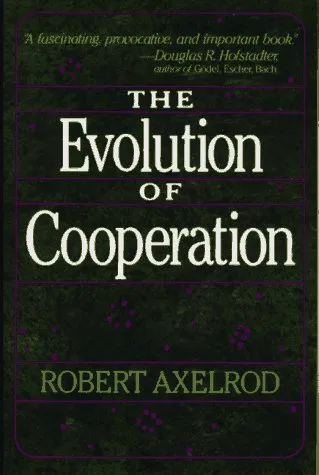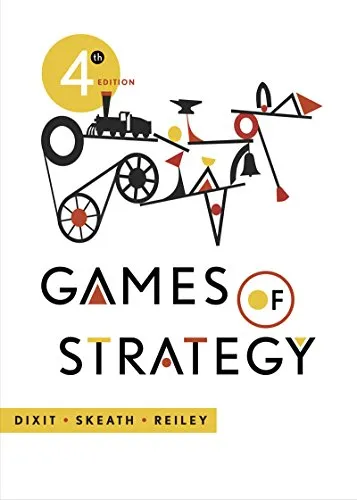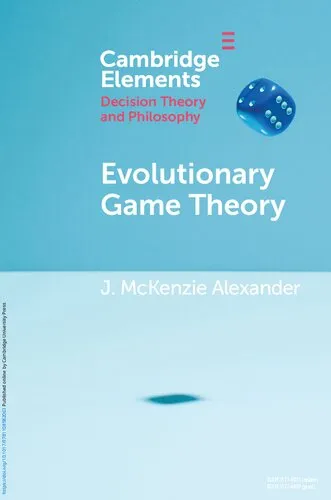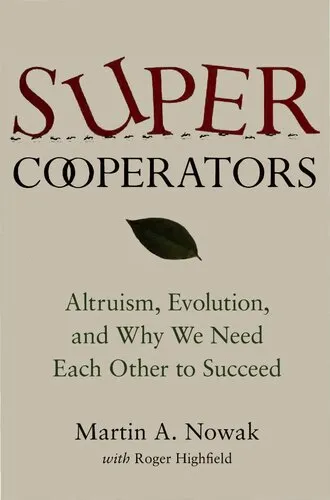The Evolution of Cooperation
4.5
بر اساس نظر کاربران

شما میتونید سوالاتتون در باره کتاب رو از هوش مصنوعیش بعد از ورود بپرسید
هر دانلود یا پرسش از هوش مصنوعی 2 امتیاز لازم دارد، برای بدست آوردن امتیاز رایگان، به صفحه ی راهنمای امتیازات سر بزنید و یک سری کار ارزشمند انجام بدینکتاب های مرتبط:
معرفی کتاب "The Evolution of Cooperation"
کتاب The Evolution of Cooperation نوشته رابرت اکزلراد، یک اثر علمی برجسته در تحلیل ریاضی و اجتماعی محبوبترین پدیدههای انسانی است: همکاری. این کتاب با بهرهگیری از اصول نظریه بازیها، مخاطبان خود را با مفاهیم عمیق و کاربردی درباره نحوه شکلگیری همکاری میان انسانها و سایر موجودات زنده آشنا میکند. کتاب به گونهای طراحی شده است که به خوانندگان این امکان را میدهد تا روابط پیچیده اجتماعی و فرآیندهای تصمیمگیری را بهتر درک کنند.
خلاصهای از کتاب
یکی از مسائل اساسی که این کتاب به آن میپردازد، این است که چگونه همکاری در میان افراد یا گروهها حتی در شرایط رقابتی میتواند بروز کند. رابرت اکزلراد با انجام مجموعهای از آزمایشها و با استفاده از تکنیک معروف "Prisoner's Dilemma"، نشان میدهد که استراتژیهای ساده و موثر میتوانند در طولانیمدت منجر به ایجاد همکاری شوند. معروفترین استراتژی که در این آزمایشها معرفی میشود، Tit for Tat است، که نشاندهنده اهمیت تعامل متقابل و رفتار پایدار است.
تحقیقات کتاب ترکیبی از مفاهیم نظری، شواهد تجربی، و مثالهای عملی است. اکزلراد با مراجعه به رویدادهای تاریخی، روابط اجتماعی، و حتی رفتارهای زیستی، نشان میدهد که همکاری میتواند یک سازوکار تکاملی برای بقا باشد. متن کتاب به گونهای طراحی شده است که هم مخاطبان علمی و هم علاقهمندان به موضوعات اجتماعی و رفتاری از آن بهره ببرند.
مفاهیم کلیدی کتاب
- اهمیت تعاملات بلندمدت در تقویت همکاری
- نقش استراتژیهای ساده و پایدار مانند Tit for Tat
- تحلیل کاربردی از بازی "Prisoner's Dilemma"
- بررسی نقش اعتماد در ایجاد روابط پایدار
- تأثیر ساختارهای اجتماعی و فرهنگی بر همکاری
- پیامدهای تکاملی همکاری در جوامع انسانی و زیستی
نقلقولهای مشهور از کتاب
"The foundation of cooperation lies not in altruism, but in enlightened self-interest."
"In an evolving system, success depends not only on the efforts of one individual but also on their interplay with others."
چرا این کتاب اهمیت دارد؟
کتاب The Evolution of Cooperation یکی از آثار برجسته در حوزه علوم اجتماعی و نظریه بازیها است. اهمیت این کتاب در چند جنبه اصلی است:
- ارائه مدلی علمی برای درک رفتارهای انسانی و زیستی در شرایط رقابتی
- توضیح نحوه شکلگیری و بقا همکاری در طول زمان
- بررسی کاربردی نظریه بازیها در تعاملات واقعی
- ایجاد ارتباط میان ریاضیات، تاریخ، علوم زیستی، و علوم اجتماعی
این کتاب ابزاری ارزشمند برای سیاستگذاران، مدیران، دانشجویان، پژوهشگران، و افرادی است که به دنبال فهم عمیقتری از رفتارهای جمعی و فرایندهای تصمیمگیری در سازمانها و جوامع هستند.
Welcome to a deeper understanding of cooperation, conflict, and the strategic interactions that shape human behavior and society. In "The Evolution of Cooperation," Robert Axelrod explores the fascinating dynamics of collaboration, even in environments where competition initially seems inevitable. Through the lens of game theory and the famous "Prisoner's Dilemma," this intellectual journey provides actionable insights into how cooperation might emerge and thrive in complex systems.
Detailed Summary of the Book
"The Evolution of Cooperation" delves into a fundamental question: how can cooperation emerge in a world where individuals act in their own self-interest? By focusing on the Prisoner's Dilemma—an iconic model in game theory—Axelrod provides a framework to study strategies for cooperation in a competitive environment. The book illustrates that under the right conditions, cooperation is not only possible but can sustain itself over time, even in scenarios where distrust runs high.
Axelrod organizes the book around experiments and simulations of repeated interactions, showing how a simple strategy called "Tit for Tat" became incredibly successful. This strategy, which involves cooperating on the first move and then replicating the previous action of the opponent in subsequent rounds, exemplifies how mutual cooperation can outcompete selfish behavior in the long term. The findings from Axelrod's research challenge conventional wisdom and offer compelling evidence that trust and reciprocity can triumph, even in environments characterized by competition.
Beyond the game-theory framework, Axelrod's work has broad implications in disciplines ranging from biology and political science to sociology and economics. From evolutionary biology to international diplomacy, the principles of sustained cooperation revealed in this book illuminate real-world scenarios where understanding cooperative dynamics is critical.
Key Takeaways
- **Cooperation can thrive even in competitive environments**: Repeated interactions and mutual reciprocity lay the foundation for trust and collaborative behavior.
- **Tit for Tat as an optimal strategy**: A simple, forgiving, and retaliatory strategy can promote long-term cooperation effectively.
- **The importance of communication**: Successful cooperation often depends on the ability to exchange signals and intentions within a system.
- **Evolutionary applications**: Cooperation’s survival isn't limited to human interactions—it appears in biological and ecological systems, shedding light on evolutionary processes.
- **Stability through repetition**: Repeated interactions and the shadow of the future transform short-term competition into long-term collaboration.
Famous Quotes from the Book
"The foundation of cooperation is not really trust, but the durability of the relationship."
"In a world where the individuals are striving for their own survival and reproduction, cooperation can nevertheless emerge."
"The key to doing well lies not in overcoming others, but in eliciting their cooperation."
Why This Book Matters
"The Evolution of Cooperation" matters because it provides a blueprint for understanding the mechanisms behind successful collaboration, even in seemingly antagonistic circumstances. In a world increasingly marked by division and distrust, the lessons in this book are more relevant than ever. Axelrod's rigorous experiments with the Prisoner's Dilemma bring hope that cooperation is not only possible but can emerge naturally under certain conditions.
The interdisciplinary implications of the book make it a treasure trove for academics, policymakers, economists, and anyone interested in addressing conflicts productively. Whether applied to business negotiations, international peacekeeping efforts, or personal relationships, the insights presented in "The Evolution of Cooperation" provide both the theoretical basis and practical tools for fostering collaboration. By understanding the dynamics Axelrod describes, we gain the ability to create systems where honest, reciprocal, and sustainable interactions flourish.
This book has stood the test of time as a definitive guide to understanding not only why cooperation matters but also how it works—and how it can be cultivated in a wide range of contexts.
دانلود رایگان مستقیم
شما میتونید سوالاتتون در باره کتاب رو از هوش مصنوعیش بعد از ورود بپرسید
دسترسی به کتابها از طریق پلتفرمهای قانونی و کتابخانههای عمومی نه تنها از حقوق نویسندگان و ناشران حمایت میکند، بلکه به پایداری فرهنگ کتابخوانی نیز کمک میرساند. پیش از دانلود، لحظهای به بررسی این گزینهها فکر کنید.
این کتاب رو در پلتفرم های دیگه ببینید
WorldCat به شما کمک میکنه تا کتاب ها رو در کتابخانه های سراسر دنیا پیدا کنید
امتیازها، نظرات تخصصی و صحبت ها درباره کتاب را در Goodreads ببینید
کتابهای کمیاب یا دست دوم را در AbeBooks پیدا کنید و بخرید
1578
بازدید4.5
امتیاز0
نظر98%
رضایتنظرات:
4.5
بر اساس 0 نظر کاربران
Questions & Answers
Ask questions about this book or help others by answering
No questions yet. Be the first to ask!

















